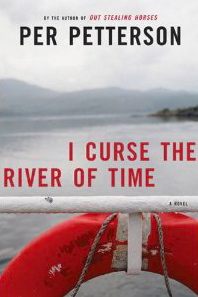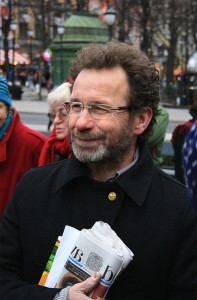“Fragile images of departure, the village back then.
I curse the river of time; thirty-two years have passed.”—Mao Tse-Tung
When Arvid re members these lines, he is reminiscing about his past in Oslo, when, as a youth, he was a devout Communist with a photo of Mao above his bed, a photo in which Mao is writing. “I always…hoped,” he says, “that it was not one of his political or philosophical articles he was writing, but one of his poems…for it showed the human Mao, someone I was drawn to, someone who had felt time battling his body, as I had felt it so often myself…”
members these lines, he is reminiscing about his past in Oslo, when, as a youth, he was a devout Communist with a photo of Mao above his bed, a photo in which Mao is writing. “I always…hoped,” he says, “that it was not one of his political or philosophical articles he was writing, but one of his poems…for it showed the human Mao, someone I was drawn to, someone who had felt time battling his body, as I had felt it so often myself…”
Arvid is fifty now, and he has witnessed the demise of Communism, the fall of the Berlin Wall, the massacre at Tiananmen Square, along with major changes in his own life and in the lives of his family members. He, too, feels like cursing “the river of time,” seeing himself as “a man out of time,” one who has learned that “in the end [beautiful experiences] could be ground into dust.” The novel opens in the middle of a swirl of memories: it is 1989, and Arvid is thirty-seven, at a major crossroads in his life. In strong musical cadences, sentences which turn in upon themselves, and unforgettable imagery from nature, the embedded story of how Arvid became the man he is strides forward to the present and retreats back into the past, driven by family relationships, his own life choices, and how they all have affected him.

When the story opens, Arvid’s mother has just discovered that she has a recurrence of cancer, and she has decided to take the ferry from Norway back to her “home,” on Jutland. Arvid has had a testy relationship with his mother over the years and has not talked with her in a while, trying to avoid telling her that he and his wife are getting a divorce, but when he gets a message that his mother has left home, he, too, takes the ferry to Jutland. During this time, he is inundated with memories, which come at random from different times in his life—his decision to become a communist, then leave college and join the “proletariat” working in the factories (like his parents); his memories of vacationing in Jutland as a child; the loss of the brother who came just after him in birth order; working at a bookshop; and taking a neighbor’s dog to be put to sleep.
Throughout, however, he returns to stories of his mother, who, though hard pressed for cash herself, still gave him money for minor luxuries when he was in college, and who, when he decided to leave college and give up his chance to escape the kind of life she and her husband had been living, smacked him, hard, across the face. The story of his eldest brother was something he never asked his mother about, though he expressed his concern. Even worse for Arvid’s confidence, he was said to look like his father, to whom he was not close.
Homely details and intense descriptions of nature give weight and importance to Arvid’s memories and what they reveal of him. On Jutland with his mother, “There were hares and hedgehogs..and pheasants with chicks that were full grown now, in November, and rodents in abundance, and hawks in the sky above, and buzzards that came sweeping out of  nowhere, and falcons hanging cruciform in the air before hurtling down, and there were owls in the oak tress, all quiet at night, where they perched on a branch in the dark and stared their prey to death, and in the black night a marten darted between the trees and up across our roof, and we could hear it.”
nowhere, and falcons hanging cruciform in the air before hurtling down, and there were owls in the oak tress, all quiet at night, where they perched on a branch in the dark and stared their prey to death, and in the black night a marten darted between the trees and up across our roof, and we could hear it.”
Though Arvid is coolly reserved and often tamps down his feelings, the reader comes to know him, understanding his mixed feelings about his mother while also recognizing his need for her, accepting his distance from his father while regretting their lack of connection, appreciating his decisions even when they seem to be wrong for him, and seeing the effects of change upon him at every stage of his life. Ultimately, Arvid becomes a character so real that even the author has said, “I recognize myself in him…and I could have behaved like Arvid, given a different set of circumstances…Sometimes I call him not my alterego but my stunt man.”
ALSO reviewed here: Petterson’s TO SIBERIA, IT’S FINE BY ME , I REFUSE, ASHES IN MY MOUTH, SAND IN MY SHOES, OUT STEALING HORSES
Photos: The author’s photo is from http://commons.wikimedia.org
The ferry to Jutland is from http://www.smyrilline.com
